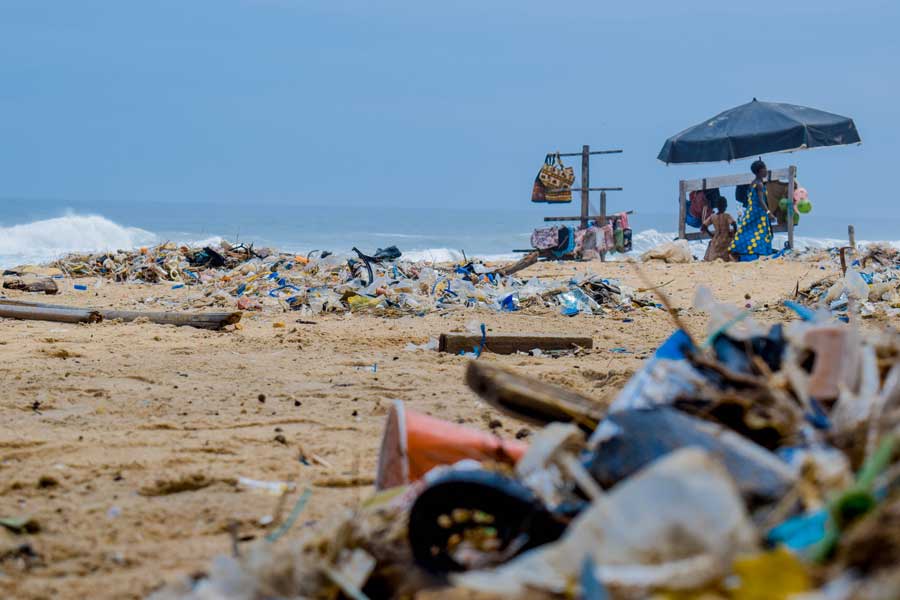The world’s oceans cover 71 percent of the earth’s surface and are estimated to contain about one million species, most of which are not even classified. The importance of the ocean is often underestimated because most of us are far removed from the vast waters. However, we benefit from the ocean every day no matter where we reside: marine photosynthesizers such as phytoplankton and seaweed produce over half the oxygen we breath; oceans regulate the climate by transporting heat from the equator; they provide transportation for 76 percent of all U.S. trade and support $282 billion of the U.S economy; oceans are the source of many medicinal products fighting diseases such as cancer and arthritis; and oceans provide the seafood that feeds multitudes of people. With the importance of the ocean, it is baffling how much lack of attention it receives and how many human habits contribute to damaging the ecology of the oceans. A report produced by the World Wildlife Fund using a Living Planet index based on trends of 5,829 populations of 1,234 marine mammal, bird, reptile, and fish species, indicates nearly a 50 percent decline in all marine life populations between the years 1970 and 2012.
Causes of Marine Life Decline
Some causes of the decline are poor regulation of fishing, human over-development, and diseases. An estimated 25 to 30 percent of the world’s fish stocks are overexploited. What this means is that we are removing too many fish year after year such that populations are not sustainable. Another effect of fishing is by-catch or the unintentional catch of other animals such as sea turtles and sharks in fishing gear. These inadvertently-caught animals are oftentimes discarded overboard, severely injured and left to die. Some of the by-catch are endangered. With the world’s human populations expanding and people wanting to have homes in desirable locations, development is an ever-increasing issue. Destruction of habitat and increased pollution are only two of the problems caused by development. When we destroy the habitats of our cohabitants on this planet, we are reducing their chances for survival. The decrease in habitat results in a decrease in resources such as food and shelter. While strong hurricanes and typhoons can also destroy marine habitat, these disruptions are generally short-term. Human disruption is significantly more impactful and persistent. For example, in 2010 the Deepwater Horizon oil spill spewed 4 million barrels of oil into the Gulf of Mexico over an 87-day period and to date we are still learning about the long-term impacts of such a disaster.
In addition to industry, shipping, agriculture, urban development, and even tourism can all have negative impacts leading to the destruction of marine habitats. Another serious issue resulting in the decline of marine life is disease. What makes disease so harmful is that it can interact with pressures such as climate change and other man-made pressures to exacerbate the decline of marine life. For example, the southern sea otter population off the southern California coast is threatened by Toxoplasma gondii, a water-borne pathogen from cat feces. This pathogen causes brain damage and seizures. Another example is the neurotoxin-producing blue-green algae, Microcystin, which is responsible for many fish kills and marine mammal deaths in many estuaries, bays, and coastal waters close to urbanized areas throughout the United States. Nutrient runoff and land-based pollution give rise to large scale algal blooms where high concentrations of the neurotoxin are produced. With all these issues, the common denominator is human influence. What we are doing today is vastly impacting our oceans.
Perhaps the greatest threat to the health of the oceans today is plastics. In 1907, the first piece of plastic was invented. It was heralded as the best gift to the modern era as it was virtually indestructible. Because plastic is not biodegradable, much of it ends up in our oceans. To date, plastics can be found in just about every part of the ocean including vast depths and remote beaches. Plastics are being found in a wide variety of marine animals, from the large Humpback whales to microscopic algae, and their damage is only beginning to be measured.
Upholding Our Responsibility as Vicegerents
When Allah told the angels He was going to create a human, a vicegerent upon the earth, they asked “Will You create a being who would cause corruption and shed blood while we declare Your praise and sanctify You” (Qur’an 2:30). Allah has entrusted us with the care of the earth for a fixed period of time. If your fellow Muslim were to allow you to borrow $100 dollars, is it not your obligation to return the borrowed funds at the end of the fixed term? Why is it then we neglect to uphold our responsibility to honor our agreement with Allah to care for this earth which He has furnished to us for our benefit? Why is it that we have turned a blind eye to the destruction of earth’s atmosphere, poisoning of earth’s waters, and squandering of earth’s natural resources? We act as if this world belongs to us when we should know better. In reality, we do know better. We know that all that is in the heavens and earth and everything in between belongs to Allah. We know that we shall return to Allah at the end of earth’s time. We know that we will be asked how our time was spent, how our money was spent, how our youth was spent. Do you want your answers to align with the assumption of the angels? Do you want your answers to be of those who sought and witnessed the squandering and the hoarding of earth’s natural marine resources? The fish are being poisoned with toxic chemicals, sea turtles are eating plastic bags, sea birds’ stomachs are filled with broken plastic bits. Is this not corruption?
We Must Stop Turning a Blind Eye
We turn a blind eye to these issues because these animals are seen as insignificant, beneath us, or simply out of sight. If this is truly our mindset, then we are no different than Iblis when Allah commanded the inhabitants of the heavens to bow to Prophet Adam and he refused. Iblis refused because he viewed himself as better than Prophet Adam and failed to obey Allah’s command. Let’s ask ourselves if we are obeying Allah’s command to act as vicegerent on this earth. The sad answer is that we continue to fail in making the connection between marine life and our own lives. We fail to realize these animals can speak for or against us on the Day of Judgement. We fail to realize that if I pour a chemical down the drain, it may end up causing lesions on fish or reducing food availability. We fail to realize that if we do not properly dispose of a plastic straw it may end up in the nostril of a sea turtle. We fail to realize that if we remove too many fish at a time, then there may be little to no fish in the coming years.
Even with the damage we have already done, there are steps we can take to mitigate and possibly reverse the impact. The three R’s— Reduce, Reuse, Recycle — may seem small but can result in significant measurable positive effects if we all participate. I encourage everyone to be mindful of the many ways to practice “Reduce, Reuse, and Recycle” on a daily basis, until it becomes habit. This practical, responsible behavior will bring us closer to the sunnah of our beloved Prophet Muhammad and will be an important facet in the overall metric of our obedience to Allah SWT.






